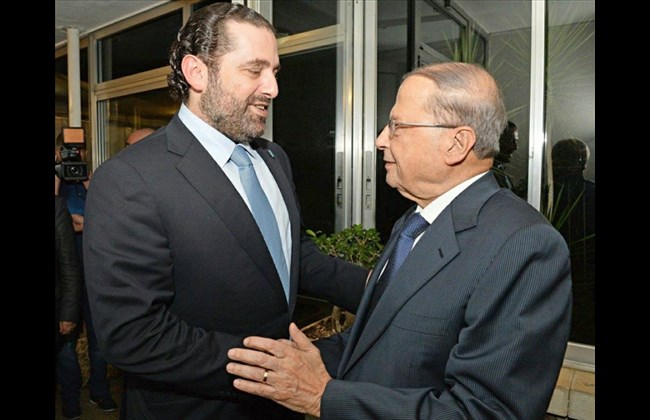Aoun has no agenda for Lebanon except more sectarianism
Ali al-Amin/The Arab Weekly//November 06/16
It was neither Lebanese democracy nor a solid economic salvation agenda for the country that carried Michel Aoun to the presidency. It was not his programme for fighting corruption, nor was it the promise to the end of the sectarian-based system of power sharing that had turned the state into religious and sectarian fiefdoms. What brought Aoun to power was something completely different.
Following two-and-a-half years without a president and more than 40 parliamentary sessions devoted to electing a president, the parliamentary alliance between Aoun and Hezbollah was successful in using the excuse of no quorum to block parliamentary elections. There was an unwise constitutional blockage imposed by the presidency of the parliament that led to the void in the position of president of the republic all this time.
So, instead of coming to the presidency through the main gate, Aoun took the back alleys of political manoeuvring and fiddling with the constitution.
Democracy in Lebanon was the big loser in the affair. Aoun and his ally Hezbollah refused to have candidates compete for the presidency in free and democratic elections inside the parliament. Aoun and his cohorts insisted on designating him president; the elections inside the parliament would just be a formality.
Aoun and Hezbollah clearly signalled that becoming president in Lebanon was not the result of free and fair elections but of working around a fragile balance of power based on military might, security considerations and sectarian struggles.
Thus, the presidency in their eyes is not really representing and working for the common interest of one state and one people but that of one faction inside one sect using the military power of another faction inside another sect. The whole operation marked the end of a democratic system that had been in place in Lebanon for decades.
In his quest for the presidency, Aoun had no real agenda for saving Lebanon from economic collapse. His political discourse and moves were centred on insisting that the flaws in the state originate from the inequity in the system of power sharing between Muslims and Christians. He even asserted the Lebanese Sunnis had confiscated some Christian shares.
Clearly, he wanted to avoid annoying Hezbollah, the same party that has gone to extreme lengths to flout the authority of the state and that has found, in Aoun, the perfect cover for its rogue actions from illegally bearing arms to fighting in Syria.
Aoun has also used sectarian discourse to blackmail his Christian opponents. He succeeded in demonstrating that, if one wants to win in Lebanon, he or she must not shy away from using sectarian divisiveness as a weapon. All crises must be turned into sectarian ones in which the various factions vie for spoils to the detriment of the state.
Investing in sectarian strife and exploiting the theme of threat to minorities enabled Aoun to obstruct the presidential elections and gave Hezbollah more clout to weaken the power of the state.
Hezbollah in Lebanon stood to win whether the presidency of the state remained void or Aoun won it. The remarkable thing in the election was that opposition to Aoun came from Hezbollah’s allies, specifically from Parliament Speaker Nabih Berri and MP Suleiman Frangieh.
Naturally, Aoun, 83, would remain true to his election platform. Faced with the sorry condition of the Lebanese state, he will do no more than continue to use his slogan Protecting Christians’ Rights and just seize more state positions for his followers.
Constantly playing the card of sectarian rights is what many on both sides of the fence desire. It guarantees continued polarisation of the society and blind allegiance to the so-called leaders and obviates the obvious option of choosing allegiance to the state and the combined authority of the constitution and the law. Those playing the game of divisiveness cannot be more satisfied.
The next phase in Lebanon will be marked by intense competition for a share in power. The concept of pact brandished by Aoun and the special interpretation of it destroys the concepts of state and of citizenship by reducing them to a form of power sharing. There should not be a pact between Muslims and Christians that replaces the law and denies the principle of equality among all citizens.
Aoun knows quite well that his new presidential powers cannot touch Hezbollah’s illegal weapons or forbid their use abroad. Hezbollah, in turn, knows that Aoun will not broach the topic, not out of fear but simply because he will continue to play the card of sectarian allegiance to the detriment of the rights of citizenship.
Ali al-Amin is a Lebanese writer.






















